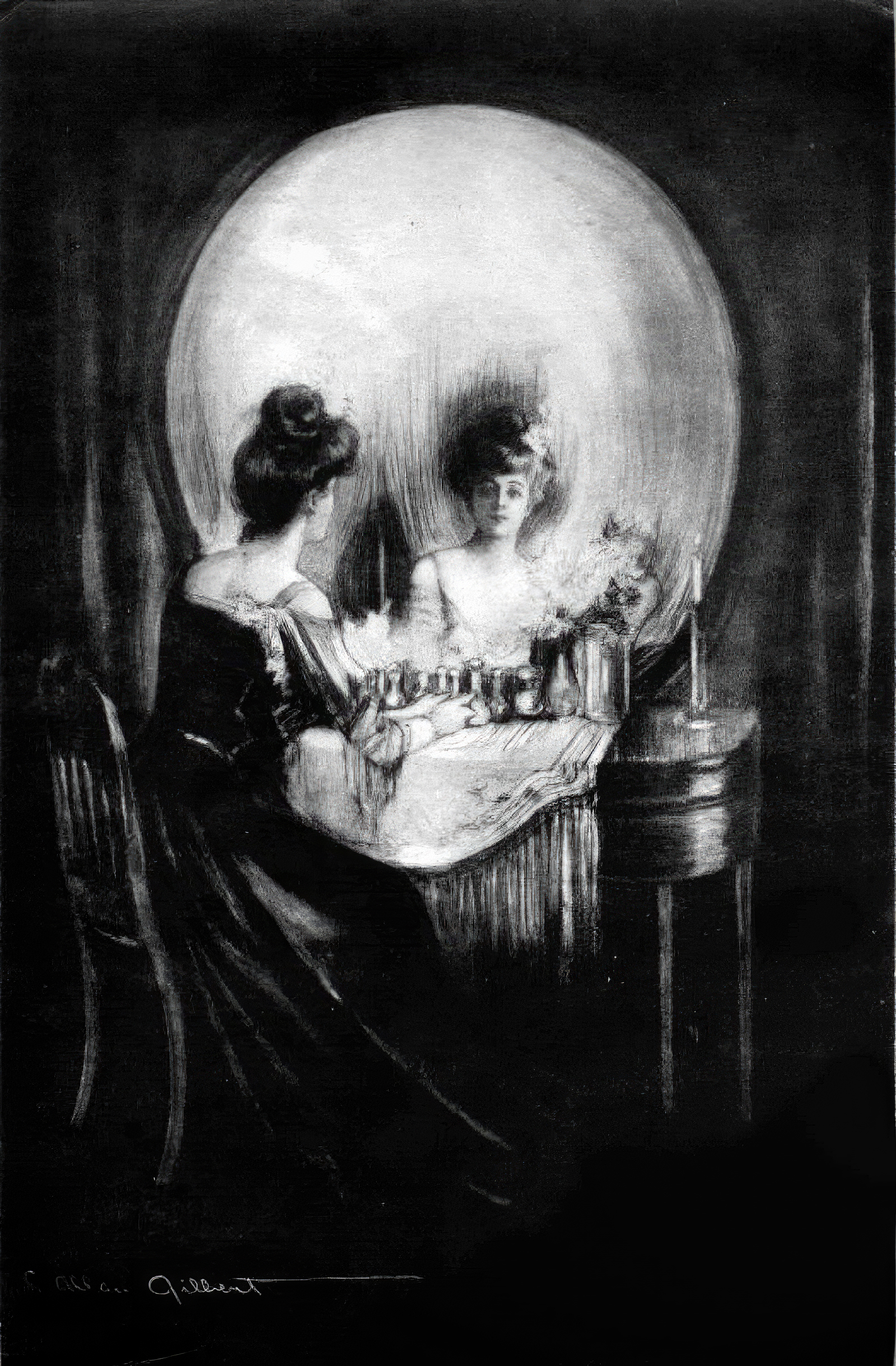
Hawkins / Stolz
Inhaltsverzeichnis: (verbergen)
|
༺·❄·༻

Reich gedeckter Tisch mit Papageien, nach 1650
༺·❄·༻ |
|
Der Anspruch des Egos auf Anerkennung ist vergleichbar mit einer Glühbirne, die sich das Verdienst des Lichtes anrechnet, während die Quelle ihrer Kraft aus der unpersönlichen Energie der Elektrizität stammt.
|
|
Stolz als Bewusstseinsebene fühlt sich im Gegensatz zu den niedrigeren Ebenen gut an und stellt viel mehr Energie zur Verfügung, als die tiefer liegenden Ebenen von Scham, Apathie und Furcht. Dennoch ist Stolz zwanghaft und illusorisch und somit nicht rechtschaffen. Scham ist gekennzeichnet durch fehlendes Selbstwertgefühl, während Stolz das Selbstwertgefühl überbetont als Folge der fehlerhaften Grundüberzeugung, dass es ein persönliches "Ich" gäbe, das die Ursache von Ver-
 All Is Vanity, 1892 C. Allan Gilbert (1873-1929) amerikanischer Maler Stolz ist Selbstbewunderung und gleichzeitig darauf erpicht, andere abzuwer-
Stolz als Prinzip basiert darauf, etwas als "mein" zu deklarieren, was eine Aus-
Hawkins sagt, dass man in Wirklichkeit nichts weiß und somit alles gesammelte, so genannte Wissen und die daraus entstehenden Meinungen und Bewertun-
Stolz ist auf jeder Bewusstseinsebene eine Verführung und drückt – im spiritu-
Heilmittel, die den ungesunden Stolz neutralisieren, sind radikale Demut, Dank-
Wo Stolz gemäß des vorherrschenden und übernommenen Werteschemas ein Versuch ist, sich vor Demütigung zu schützen, ein Niemand zu sein beziehungsweise ein besonderer Jemand zu sein, da schützen Dankbarkeit und Würdigung (Ehrerbie- |
|
Ungesunder Stolz ...
|
| Siehe auch: ► Narzissmus und ► Würde ► [*] Gnadengaben und Tugenden ⇔ Leidenschaften und Laster – Caroline Myss |
|
Scham BW 20-29 |
Stolz – BW 175-199 |
| Fehlende Selbstachtung | Fehlende Achtung vor anderen |
| Selbsthass | Selbstverliebtheit |
| Selbstwert-Erniedrigung | Selbstwert-Erhöhung |
| Gedemütigt | Schutz vor Demütigung Fehlende Demut |
| Überzeugt, ein Niemand zu sein Angst davor, niemals ein Jemand zu werden | Überzeugt, ein Jemand zu sein Angst davor, ein Niemand zu werden |
| SELBST-Hass | SELBST-Gleichgültig |
|
Stolz lässt sich transzendieren, indem man beispielsweise die Formulierung
Unterlässt man es, das besitzanzeigende Fürwort "mein" anzugeben, kann die Dankbarkeit zunehmen.
Dankbarkeit ist ein Gebet des Augenblicks, das Stolz und Eitelkeit neutralisiert. |
|
| Quellen (engl.) mit und von Dr. Caroline Myss (*1952) US-amerikanische mystische Bewusstseinslehrerin, Energiemedizinerin, intuitive Diagnostikerin, Erfolgsautorin ► Audiointerview Healing Beyond Reason [Heilung jenseits von Vernunft], präsentiert von dem US-amerikanischen Multimediaverlag Sounds True, "Insights at the Edge", Verlegerin und Gastgeberin Tami Simon (*1953), Minute 48:15, 55:44 Minuten Dauer, 12. August 2009, archiviert 21. Oktober 2015 ► Buch Defy Gravity. Healing Beyond the Bounds of Reason, Hay House, 13. Oktober 2009, 2. Auflage 15. January 2011 |
| Siehe auch: ► Gnade und ► Caroline Myss und ► Tugend |
|
|
| Siehe auch: ► Stille und ► Geschichtensammlung |
Konkurrenz und Konkurs leiten sich beide aus dem lateinischen Wort concurrere = zusammenlaufen ab.
| Zitate | Sinngehalt |
| Ich bin nicht jeder! | Stolz, Angst vor Demütigung |
| Nun, das ist wahr! Du bist ganz sicher nicht jeder – Und jeder ist jeder. | Würdevolle Demut Wertschätzung eines Einzelnen durch Würdigung aller |
| Es sollte Spaß machen. Und weiter nichts. | Ichbezogen Ohne Verbindung zum Ganzen |
| Finde die Freude in deinem Leben, Edward. | Sinnsuche, Visionsqueste |
| Ich bin zutiefst stolz darauf, dass dieser Mann es für wert erachtet hat, mit mir befreundet zu sein. | Dankbarkeit durchzogen mit Stolz |
| Er hat mein Leben gerettet. Und das wusste er, bevor ich es wusste. | Stolz durch Dankbarkeit und Ehrerbietung transzendiert
|
|
Legende:
|
| Quelle: ► aus Filmzitate Das Beste kommt zum Schluss (2007) Source: ► Excerpted from the US American movie The Bucket List, released 11. January 2008 YouTube clip The Bucket List – Ending, 4:38 minutes duration, posted 9. April 2009 |
| Siehe auch: ► Würde |
| See also: ► Dignity culture ⇔ Pride culture |
Mark Twain (1835-1910) US American humorist
George Lamsa ersetzte die Wendung 'im Geiste' mit 'Stolz'.
Persönliches Bekenntnis
Im Zusammenhang mit der Debatte um Zuwanderung und die "deutsche Leitkultur" löste Mayers Aussage [Schlagwort] deutschlandweit eine Debatte zum prekären Thema Nationalstolz aus.
Appell

Anspruchsdenken
Verleugnung
Schlussfolgerung
|
|
Literaturzitate
Humor
|
Stolz |
Personal avowals
See also: Dichotomy between Somebody ∞ Nobody ⇔ Everything ∞ Nothing
In connection with the debate about immigration and the "German guiding culture", Mayer's statement [key phrase] triggered a debate throughout Germany on the precarious topic of national pride.
Conclusions
Propaganda
Appeal
|
Fundamental culture: based on human dignity, equality, caring LoC 200+
Secondary culture: status based, pride⇔shame based Below LoC 200
|
|
Alternative source: Brian Gleason, Mortal Spirit. A Theory of Spiritual-Somatic Evolution, S. 159, Writers Club Press, 2001
Isis is the Egyptian Goddess of fertility.
|

Literary quotes
| Source: ► Dr. Wayne Dyer [LoC 450] (1940-2015) US American self-help advocate, spiritual lecturer, author, 2008 |
| See also: ► Letting go/Letting be and ► Ego and ► Vulnerability |
|
Pride attaches undue importance to the superiority of one's status in the eyes of others. |
| Source: ► Lao Tzu (604-531 BC) Chinese sage, philosopher, founder of Daoism, Tao Te Ching [The Book of the Way], verse 13, 800-200 BC |
| See also: ► Lao Tzu and ► Level 20 – Shame and ► Level 30 – Guilt |
|
Blessed are the poor in pride[*],
[*] The translator George Lamsa replaced the word 'spirit' with 'pride'. |
| ||||||||||||||||||||||||||||||||||||||||
| ||||||||||||||||||||||||||||||||||||
| Sources featuring Caroline Myss Myss.com (*1952) US American spiritual teacher, mystic, medical intuitive, bestselling author ► Audio interview Caroline Myss: Healing Beyond Reason, presented by the US American broadcasting station Sounds True, "Insights at the Edge", host Tami Simon (*1953), podcast, minute 48:12, 55:44 minutes duration, aired 12. August 2009 archived 21. October 2015 ► Video DVD presentation The Seven Graces and Shadow Passions of your Soul, Scotland, Great Britain, archived by Myss Digital Media, part 1, session 1, 59:54 minutes duration, recorded 17.-19. September 2011 |
| Reference: ► Video keynote address by Caroline Myss Myss.com (*1952) US American spiritual teacher, mystic, medical intuitive, bestselling author, Defy Gravity: Healing Beyond the Bounds of Reason, part 2, presented by the US American publisher Hay House, "I Can Do It!" conference, Tampa, Florida, 44:57 minutes duration, aired 22. November 2009 |
| See also: ► Caroline Myss and ► Virtue |
|
| See also: ► Questions and ► Silence and ► Stories |
| Quotations by Edward and Carter | Orientation – focus |
| I'm not everyone! | Pride, Fear of humiliation |
| Well, that's true – you're certainly not everyone, and everyone is everyone. | Dignified humility Valuation of the individual by appreciating all |
| This was supposed to be fun. That's all it ever was. | Ego-centered Not connected to the whole |
| Find the joy in your life, Edward. | Visionquest |
| I'm deeply proud that this man found it worth his while to know me. | Gratefulness pervaded by pride |
| He saved my life. And he knew it before I did. | Pride transcended by gratefulness and reverence |
|
Legend:
|
| Source: ► Excerpted from the US American movie The Bucket List, released 11. January 2008 YouTube clip The Bucket List – Ending, 4:38 minutes duration, posted 9. April 2009 Memorable quotes from The Bucket List, presented by imdb.com, 2007 |
| See also: ► Culture and ► Dignity |
| Siehe auch: ► Würdekultur ⇔ Stolzkultur (Filmbeispiel) |
Englisch
Nach der Skala des Bewusstseins von Dr. David R. Hawkins sind folgende unterschiedliche Ausdrucksarten von Narzissmus und ihre jeweiligen Bewusstseinswerte zu beachten:
| Quellen: ► ⚡ D. Hawkins, Truth vs. Falsehood. How to Tell the Difference, Kapitel 11 The Downside of Society, S. 202, 292, 2005 ► ⚡ D. Hawkins, Reality, Spirituality, and Modern Man, 2008 |
Source: ► ⚡ D. Hawkins, Truth vs. Falsehood. How to Tell the Difference [Status ~2004]
Englische Werke
Links zum Thema Stolz / PrideLiteraturLiterature (engl.)
Affect theory attributed to Silvan Tomkins
Externe Weblinks
Linklose Artikel
External web links (engl.)
Audio- und VideolinksAudio and video links (engl.)
Linkless media offerings |
Englisch Hawkins
Wiki-Ebene
Englisch Wiki
1 Reality, Spirituality, and Modern Man, 2008 ⇑
2 Power vs. Force. The Hidden Determinants of Human Behavior, chapter 4, S. 83, Hay House, February 2002 ⇑
3 The Eye of the I From Which Nothing is Hidden, S. 79, 2001 ⇑
4 Houston Seminar The Realization of the Presence of God, Unity Church, Texas, 11. October 2003 ⇑